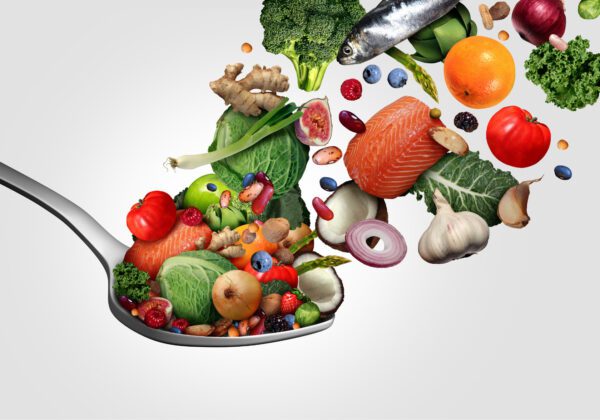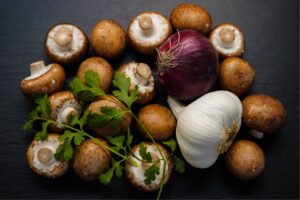At our cores, we all know we’re limited in what we can control in our lives. As a nutrition professional, I try to teach people that getting into the habit of eating nourishing food is one way to be in the driver’s seat, among other benefits of course. As we are now managing yet another pandemic flare up, why not exert some control over our health, and in particular our immune systems, through excellent nutrition?

Easier said than done. And what exactly is excellent nutrition? The answer to this has gotten complicated over the years, and the opinions endless, much to our detriment. In my view, it’s simple: good nutrition is a diversity of real foods, or foods found in nature, that your body can tolerate. (By “tolerate,” I’m referring to food allergies and sensitivities, but more on this in a moment.) If the one change that anyone makes is transitioning from mostly processed to mostly whole foods, it would be a monumental start. Not to mention have a profound impact on our healthcare system. So that’s where I always begin. Many of us are hooked, to some degree, on our modern food supply, which is not at all aligned with our biological needs.
Why not? Our digestive and immune systems weren’t designed to handle “foreign” substances like foods synthesized in factories. These products of The Industrial Revolution weren’t originally intended to hurt us but rather provide convenience. Yet as they’ve become more and more unrecognizable, our bodies pay the debt. After repeated ingestion, these foreign molecules inflame the small intestine, impair its lining and enter the bloodstream. (If you’ve ever heard the term “leaky gut,” that’s what this is.) This sets off an immune response that can be manifested by headaches, fatigue, joint pain and more.
There’s another problem with processed food, other than its chemical preservatives and additives: Much of it contains excess sugar. Research conducted decades ago linked excess sugar consumption to impaired and/or reduced white blood cells, which fight our infections. Not only that, vital minerals like zinc and magnesium are excreted as a result of insulin elevations, which are triggered by excess glucose. Our bodies were designed to metabolize about a teaspoon daily of natural sweeteners like honey, yet we consume far more than that – and typically in non-natural, nutrient-deficient forms – because it is so readily available in our factory foods.
So now we know what to avoid. But what to eat? Nourishing foods are clean animal protein sources like grass-fed beef or pastured eggs; fats such as nuts, avocados, olives, unrefined oils and butter (yes, butter); legumes such as sprouted lentils; whole grains like rice or quinoa; and colorful fruits and vegetables. Eating a balance and diversity of real foods that make you feel well is the foundation of a resilient immune system.
It’s worth mentioning that some foods produced in factories are okay, such as a jar of pickles or a container of yogurt, as there are a couple steps involved in getting them from nature to store shelves. These foods are considered “minimally processed” and unless you have the time to ferment your own pickles (not a bad idea, fermented foods support the gut), you’ll be relying heavily on these pantry staples, which is perfectly healthy. Just check labels so you can avoid products with added sugar and/or chemicals.
By the way, overhauling one’s diet is a challenging endeavor. If you’re not sure where to start, Eating for Your Health is a local program that helps people determine which whole foods work best for them and teaches them how to prepare those foods.
Beyond minimizing fake foods and excess sugar, and relying more on a diversity of whole foods, here are additional tips for boosting your immune system:
Address any food allergies or sensitivities

In the same way that “foreign” foods inflame and compromise the gut, foods to which we’re sensitive have the same effect. The best way to determine if you have food sensitivities or delayed food reactions (but not immediate and acute allergic reactions – that is a different story) is through an elimination diet. This calls for removing commonly reactive foods for a period of time, reintroducing them one at a time, and watching for reactions.
Factors that can contribute to food reactivity include eating a narrow range of foods and ingesting food toxins such as pesticides, GMOs, “natural flavors,” artificial sweeteners and MSG. Food reactivity can be resolved, though, by pivoting toward a diverse real-food diet and periodically following elimination protocols.
Focus on food quality
 Food quality is of utmost importance, because even sources of real foods can be tainted or otherwise compromised. With animal foods, look for “pasture-raised” and “organic” labels, which signify that animals haven’t been pumped with antibiotics (especially damaging to gut health) and hormones, or raised on feed unnatural to their species. With plant foods, “organic” fruits and vegetables have fewer toxins and are nutritionally superior to conventionally-grown produce.
Food quality is of utmost importance, because even sources of real foods can be tainted or otherwise compromised. With animal foods, look for “pasture-raised” and “organic” labels, which signify that animals haven’t been pumped with antibiotics (especially damaging to gut health) and hormones, or raised on feed unnatural to their species. With plant foods, “organic” fruits and vegetables have fewer toxins and are nutritionally superior to conventionally-grown produce.
In addition to buying organic, eating locally – and by extension, seasonally – also ensures high nutrient-density. A food’s nutrient content begins to deteriorate after harvest, so plants grown close by will get to your plate sooner, ensuring more nutrition. Here in the Garden State, we’re surrounded by dozens of small farms that grow and harvest beautiful produce. Discover them at the Princeton Farmers Market, or to find out which ones you can visit directly, see this listing of local farms.
Consume immune-enhancing and detoxifying foods

I’d like to highlight a few foods that are especially supportive to immune health. Garlic is one, and research has
illustrated its role in stimulating the production of white blood cells, activating detoxification enzymes and a lot more. Whey protein, if you can handle dairy, is another food with numerous beneficial compounds. Just make sure that you pick up “undenatured” whey protein powder. All varieties of mushrooms are also protective, with their antioxidant and anti-inflammatory effects.
Cruciferous vegetables like kale, cauliflower and Brussels sprouts have sulfur amino acids that enable the liver and cells to detoxify well. Indeed, all highly-pigmented fruits and vegetables are loaded with anti-inflammatory phytonutrients as well as micronutrients that serve as cofactors in several immune processes. To find these foods locally, check out Whole Earth Center, which carries a gorgeous array of organic produce and other health-promoting foods.
Last but not least, manage chronic stress

As a holistic practitioner who also considers lifestyle habits, I can’t underscore enough the importance of stress management. The relationship between stress and disease has been known since the time of the ancient Greeks. Chronic stress suppresses immune function, as ongoing activation of our stress hormones depletes nutrient and other critical biochemical reserves. On top of this, chronic stress can lead to poor quality sleep, which further contributes to immune suppression.
Everyone manages stress differently, but these are strategies that have helped my clients: a less cluttered calendar, regular walks in nature or any form of moderate exercise that is enjoyed, less social media, daily meditation or breath work, talk therapy, journaling or writing letters, gardening, nurturing important relationships, laughter, reading an engrossing book, and prioritizing sleep. You’ll have to find out what works best for you, but no matter what, stress reduction equals greater immune system resilience.
Opportunities to take control and bolster your health are all around you. See what works, take it one step at a time and be kind to yourself in the process. And find support if you need it! When the next variant is upon us, you won’t regret your efforts. In the meantime, stay safe.

Lee Yonish is a certified nutrition consultant at Princeton Integrative Health in Lawrenceville. She works with individual clients to address their health challenges through targeted nutrition and lifestyle strategies. Before nutrition consulting, Lee held various leadership roles in the community, all with the same mission of teaching people how to turn around chronic health issues with whole food. She received her certification in holistic nutrition from Bauman College. You can contact her at lee@princetonih.com or check out www.princetonih.com for more information.